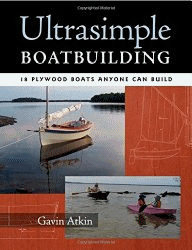Thursday, August 29, 2013
Browse »
home»
Birdsmouth Mast - Day 5
 This morning I unwrapped the mast from its overnight coat and was pleased to see that the epoxy was well set. So I enthusiastically set about planing back the mast - first removing the epoxy coat from the wood was quite a struggle - even my trusty farriers file was baulking at the challenge. I alternated between it an an old Anant Jack plane which did a reasonably job, still by lunchtime I had just about removed all traces of epoxy.
This morning I unwrapped the mast from its overnight coat and was pleased to see that the epoxy was well set. So I enthusiastically set about planing back the mast - first removing the epoxy coat from the wood was quite a struggle - even my trusty farriers file was baulking at the challenge. I alternated between it an an old Anant Jack plane which did a reasonably job, still by lunchtime I had just about removed all traces of epoxy.
 I raised the mast vertical to see how manageable it is - quite a handful, but then there is lots of material to be removed as I had only placed 50% of the taper in the staves width. This sounded like a good idea at the time, courtesy of John O'Neill article, but the reality of planing back so much taper is quite a drudgery.
I raised the mast vertical to see how manageable it is - quite a handful, but then there is lots of material to be removed as I had only placed 50% of the taper in the staves width. This sounded like a good idea at the time, courtesy of John O'Neill article, but the reality of planing back so much taper is quite a drudgery.
 Out with the Foreplane and the additional heft was giving me some advantage, but only later in the day did I take time out to resharpen the blade, which made a considerable difference.Duh!! However by that stage I was quite tired so resigned myself the the fact that my mast was going to take longer than 5 days!.
Out with the Foreplane and the additional heft was giving me some advantage, but only later in the day did I take time out to resharpen the blade, which made a considerable difference.Duh!! However by that stage I was quite tired so resigned myself the the fact that my mast was going to take longer than 5 days!.

Birdsmouth Mast - Day 5
 I raised the mast vertical to see how manageable it is - quite a handful, but then there is lots of material to be removed as I had only placed 50% of the taper in the staves width. This sounded like a good idea at the time, courtesy of John O'Neill article, but the reality of planing back so much taper is quite a drudgery.
I raised the mast vertical to see how manageable it is - quite a handful, but then there is lots of material to be removed as I had only placed 50% of the taper in the staves width. This sounded like a good idea at the time, courtesy of John O'Neill article, but the reality of planing back so much taper is quite a drudgery. Out with the Foreplane and the additional heft was giving me some advantage, but only later in the day did I take time out to resharpen the blade, which made a considerable difference.Duh!! However by that stage I was quite tired so resigned myself the the fact that my mast was going to take longer than 5 days!.
Out with the Foreplane and the additional heft was giving me some advantage, but only later in the day did I take time out to resharpen the blade, which made a considerable difference.Duh!! However by that stage I was quite tired so resigned myself the the fact that my mast was going to take longer than 5 days!.So far I have been planing back the taper while keeping the mast octagonal - which I think make for a more uniform approach. I did take time out to research making a a spar gauge for 16 sides, and while it seemed to be a sturdy gauge, the pencils lead kept breaking and so in reality was not a success. Maybe I can replace for two ballpoint pens and see how that
works out...maybe others have better ideas?? Please feel free to comment.
works out...maybe others have better ideas?? Please feel free to comment.
I transferred the dimensions at the various stations onto my workbench (ladder) and used a calipers to constantly check my taper. This was quite depressing....several passes of the plane on eight sides just for 1 millimeter! I need to take up to 5mm off the staves in some parts!
I'm beginning to doubt the wisdom of only taking 50% of the taper from the width of the staves as the result is that the planing of the outside of the mast is leaving the shape of the birdsmouth joint asymmetrical and could even results at the very top of the mast where the birdmouth joint just becomes an edge joint, although that may not be a problem as there is a solid plug at that point. I also had some excellent feedback from Dave Johnson who recently completed his Somes Sound and blog. Dave also built a birdsmouth mast but did not increase its diameter from the specified width of the solid mast. Dave reports that the boat sails really well and the mast is light. You can see his excellent blog here and admire a beautifully build Somes Sound.

Subscribe to:
Post Comments (Atom)



No comments:
Post a Comment